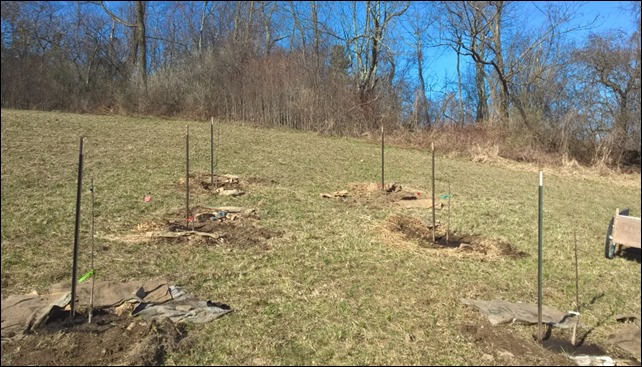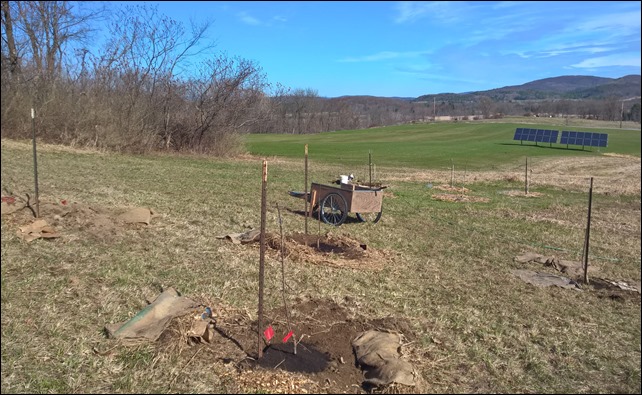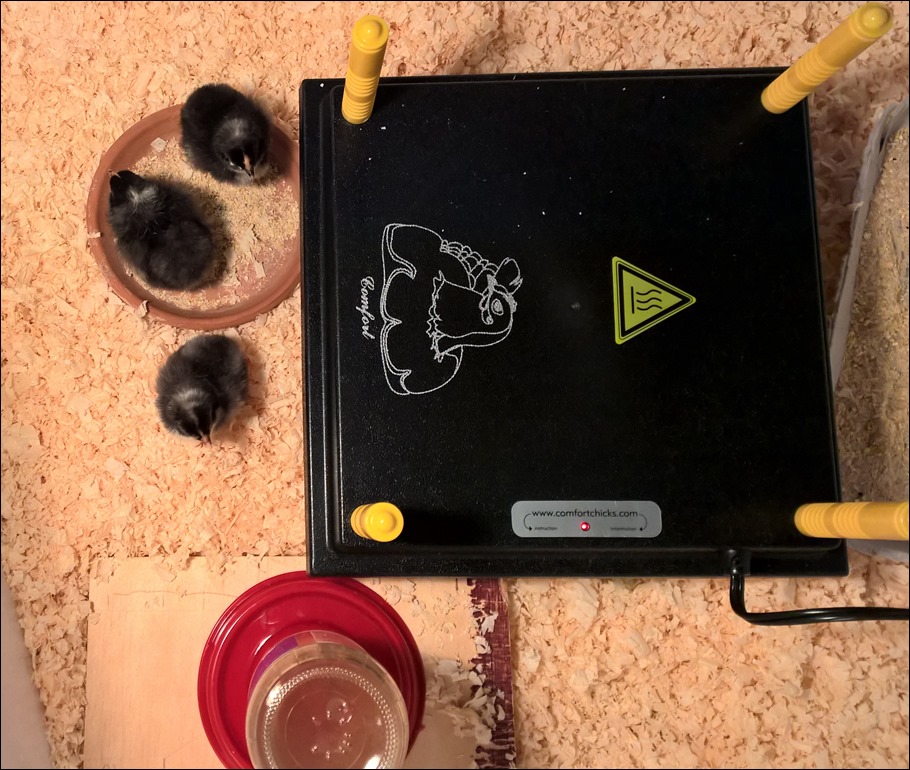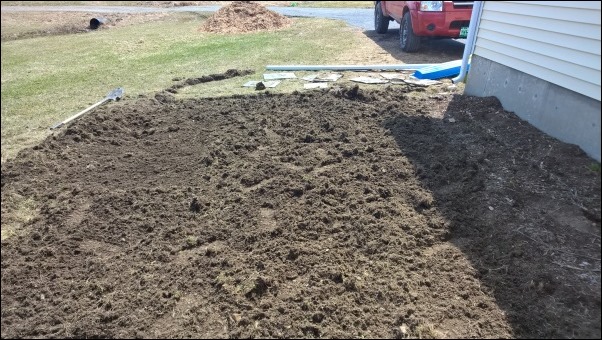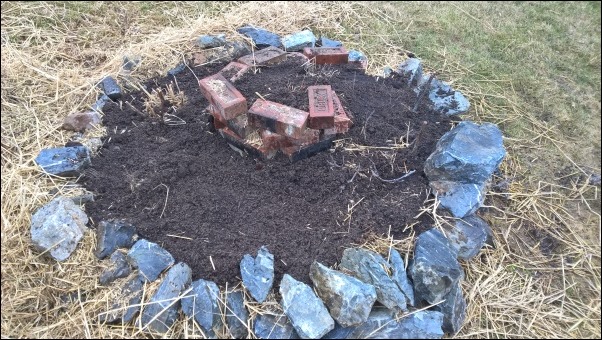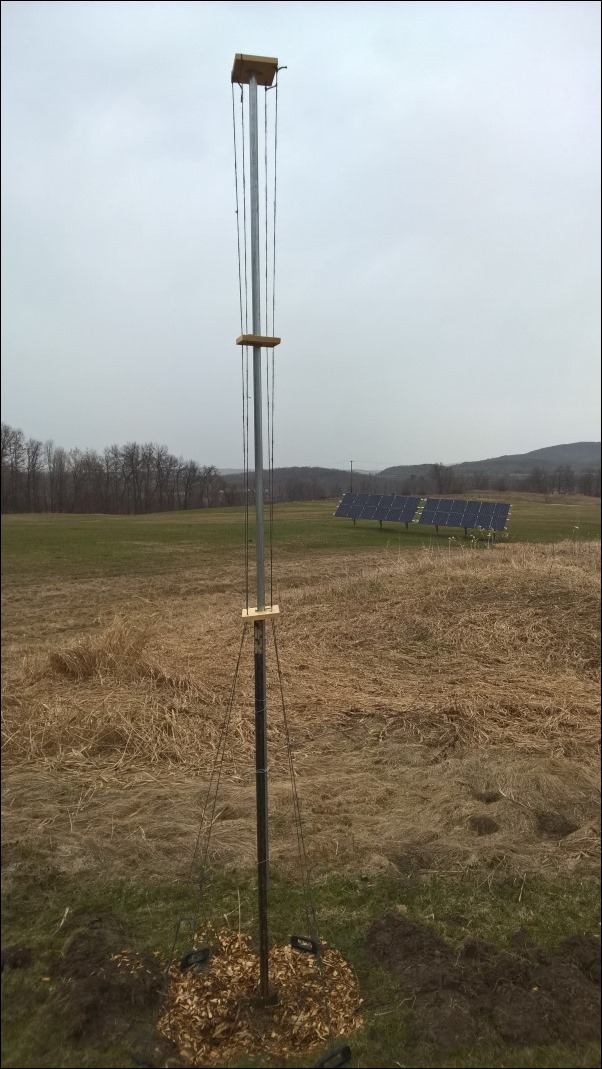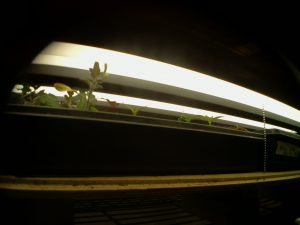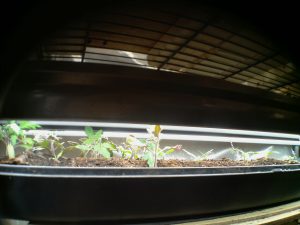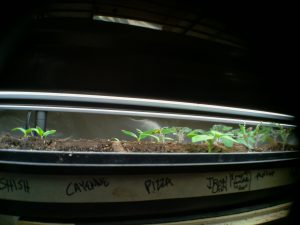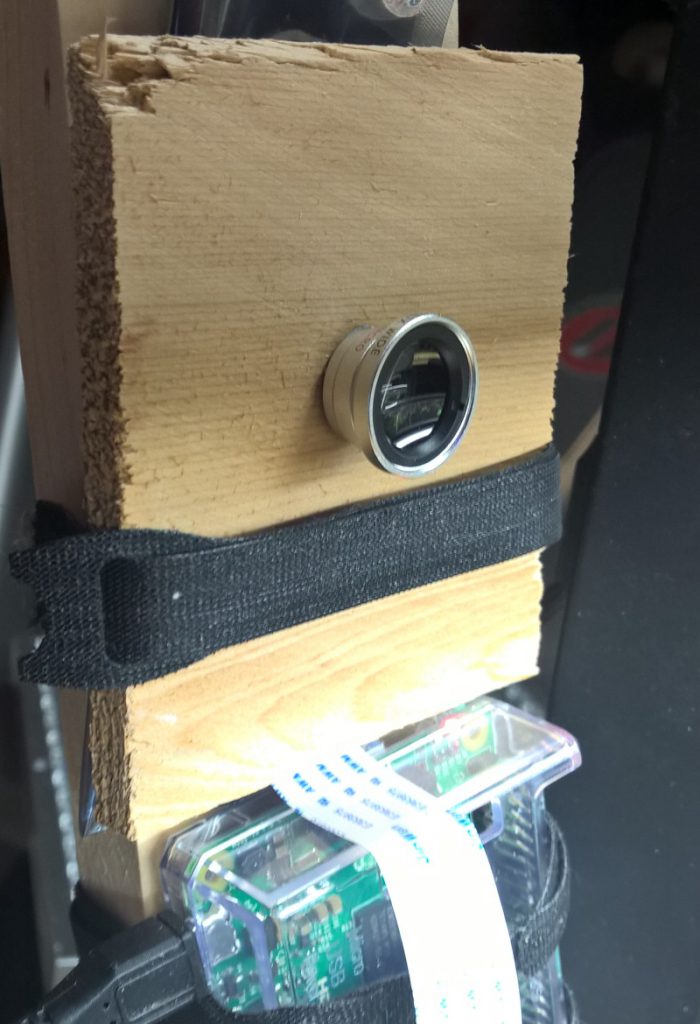Current state of the tomato seedlings, automatically posted from my Raspberry Pi 2 
The orchard, year two
We’re continuing to build the orchard this year, adding four more apple trees and 3 cherry trees.
The apple varieties for this year are:
Northern Spy
Wickson Crab
Newtown Pippin
Golden Russet
Most have multiple uses, but the primary purpose of these is to provide blending options for hard and sweet cider. Despite the tough skin, I really like the taste of the various Russets I’ve tried. Northern Spy is quite nice as well, although it takes a long time to start fruiting. Once it does though, these trees can last 100 or more years if they take off and find a good growing environment.
The cherries we got are some basic sour varieties:
Morello
Montmorency
There are a couple reasons we want cherries. Besides the obvious use in pies, we also like making our own maraschino cherries for Manhattans, Old Fashioneds, etc and eventually I would like to try using cherries in sour beers. We are also getting a sweet cherry separately from a local nursery that is a bit older and should start bearing a little sooner. That will be mainly for fresh eating and juice.
First hatch
This spring we decided to try to hatch some of our own eggs since it turned out we had a rooster. Looks like we’ll end up with 9 chicks out of 16 eggs, which isn’t too bad. We might have gotten a couple more, but we had a power outage of all times right on hatch day. It was only for about 40 minutes, so I think the humidity stayed okay, but the temp might have dropped a bit too much. Can’t tell for sure. Could also be those chicks just weren’t viable to begin with.
What I didn’t realize with our Cuckoo Maran rooster is that all the chicks will have some bar/cuckoo patterning, so it’s going to be very hard to tell them apart. Hopefully as they get older and get their true feathers, there will be some distinctions. But we definitely didn’t get any of the stereotypical fuzzy yellow chicks. I still think they are really cool looking though.
We are hoping to get at least one or two “Olive Egger” hens out of this, since we crossed the Maran (which has dark brown eggs) with our three blue egg layers (two Araucana, 1 Lavender Ameraucana). That cross should give us some type of dark green egg.
As far as the roosters, we’ll probably throw them out on pasture and then they will be headed for freezer vacation. In the meantime I need to learn how to butcher my own chickens from someone around here.
Spring tasks have begun
After a fairly nice spring week with temperatures in the 60s much of the time last week, it’s finally getting to the point where some outside work can start. This past weekend was a busy one.
One of the items on the agenda for this spring is to do some initial work on the landscape design we had created last summer. A week or so ago we got a bunch of diseased or badly shaped trees removed from the property. We have a lot of specific trees and spots in the plan, so it will be easier just to start over with exactly what we want. We’re planning to test a few evergreens for our windbreak and may also start planting along the driveway. I also ordered some smaller shade and decorative trees from Arbor Day just to see if I can get any of them to take off. They come very small and will take a long time, but the cost is significantly less than buying 3-4 year old trees. So we’re hoping to do a mix of more established plantings and let some things take a bit longer.
Another spot I am prepping this year is the front of the house. We plan to put up bushes in front of the porch (probably something like Red Twig Dogwood or Miss Kim Lilac). We’re also going to re-do the walkway from the drive to the porch and extend the perennial beds to flank both sides of the walk. I made a good dent in the prep over the weekend and here’s what it looks like so far.
Here is the spot for the revised walkway and perennial beds. The tulips are already poking up from a smaller bed against the house that we started when we moved here.
Here is in front of the porch. I’m trying cardboard on one side and using the tiller on the other side. Tiller is faster, but a lot more manual labor.
In addition, I’m moving an existing raised bed over to the other side of the garden and attempting to clear a spot for the small greenhouse I bought this spring. Unfortunately the ground is still very mucky and wet, so it’s still too sloppy to use as a base for a structure. Based on how our ground is, I’ll probably have to put down some stone and/or gravel to get a good base.
We also continue to get seeds and transplants into the ground, so far just cool weather loving plants like greens, brassicas, etc. The garlic and shallot are poking up above the soil. No asparagus yet and the strawberries are still mulched. Peas are getting sprouted indoors again and Ezra was excited to get to plant some of the snow peas this weekend. The herb spiral is now cleaned up and fresh soil added. Still not sure if some of the plants survived the winter, such as rosemary, thyme, sage and lavender. Hoping the heavy straw mulch did the trick.
I put together one of the hop poles as outlined in the Planet Whizbang Idea Book for Gardeners by Herrick Kimball. I think it should work pretty well for hops at a backyard gardener level. If we ever get more into real hop growing, we’ll need real hop support poles. But this should be fine for now.
The front garden is more dry than the back garden, but both are still too wet to plant. I tried to run the tiller on Saturday, but was only able to get a couple of runs in before giving up. It kept clogging up and it’s just not good for either the tiller or the soil when it’s like that. Got a couple of the dryer sections done though, so that will make room for a few things. We still have at least a month here before typical last frost, so no reason to rush. It’s supposed to turn colder again this week, but I imagine the week after that will be busy again as we have apple trees, cherry trees, raspberries and those Arbor Day trees all coming within the next month.
Snapshot of the seedlings on Friday, April 17
Snapshot of the seedlings on Wednesday, April 15
Snapshot of the seedlings on Tuesday, April 07
First time lapse video of pepper and tomato sprouts
As I mentioned in my last post, I’m working on a project with the Raspberry Pi 2 and one of the things I’m doing is playing around with the camera module.
This little camera is not bad (similar to a cell phone camera), but it definitely does best at a bit of a distance. Probably 6-10 feet at least. I need to be a bit closer to get enough detail and also due to the limited spacing between the grow lights and the seed trays. I ended up picking up one of those cheap little sets of lenses you can get for cell phones. It’s not going to win fine photography awards, but it’s just fine for my needs. The kit includes a fisheye, wide angle, macro and telephoto lens. Here’s a closeup of one of the lenses in place.
My camera mount is a very primitive holder I threw together out of scrap wood, but it does the job.
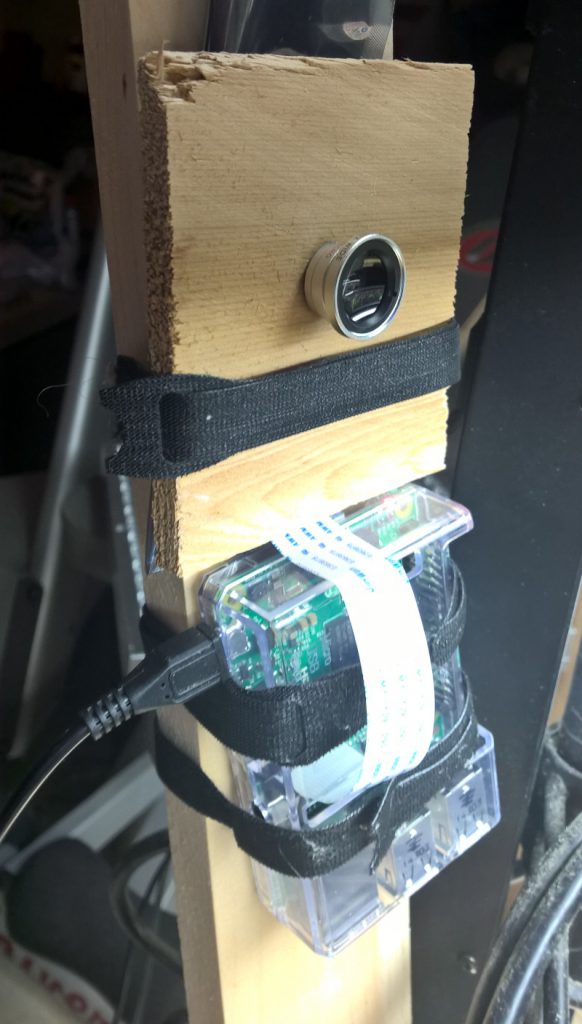
Here is a wider shot of the seed starting area with the camera mount in place. I have it taking photos every 30 minutes of one of my pepper and tomato seed starting trays.
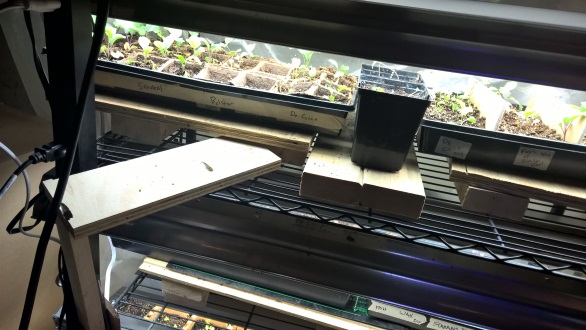
Here is an initial time lapse video showing some of the seeds sprouting and growing. This was taken over the course of 5 days, March 26-30. I do change the camera position and seed tray position slightly, so it’s a bit jerky in spots.

